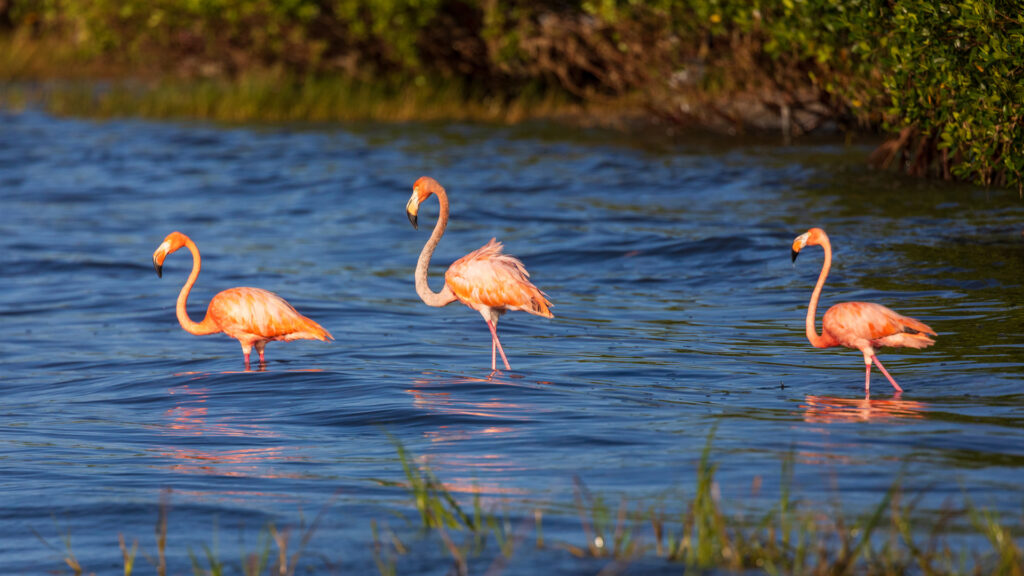By Hilary Flower, Flamingo Working Group
When you land at the Tampa International Airport, you can’t miss the 21-foot flamingo. At first, I rolled my eyes; after all, flamingos are always in our face here in Florida. But recently I’ve realized the disruptive aspect of this art installation. It doesn’t show off the lawn ornament’s iconic shape. Instead, it confronts us with a massive and naturalistic pink head and knobbly feet, as it would be seen below the surface of shallow water. It places us with a shrimp’s eye view of this startling creature, immersed in its world.
This is an important shift in perspective. After all, flamingos were here long before humans began to populate the peninsula thousands of years ago. Florida is the flamingo’s birthright. The title of the airport art installation is “Home.”
At a recent dinner party, I asked the dozen Florida folks seated around the table why the flamingo is so often used as a symbol for Florida. “Because it’s so striking and pink.” “Because it’s so beautiful.” “Because it’s so exotic looking.”

I probed, “And is it native? Is it supposed to live here? Does it live here?”
My friends frowned and looked at each other uncertainly. They didn’t think so. We do have captive ones, of course, in places like Sunken Gardens. One friend said, “Isn’t it from Africa? Or the Caribbean?”
Until recently, the official government stance was similar. In 2018, Steven Whitfield and other researchers from the Flamingo Working Group set about to answer the question: Are flamingos native to Florida? They delved into archives and museum collections and found abundant evidence that thousands of flamingos lived and bred here prior to 1900.
The misclassification was understandable because flamingos were one of the first species to be extirpated from the state. By 1925, people had killed them all, for feathers to adorn ladies’ hats and, believe it or not, for food. This only left the captive ones and the occasional escapee.
Flamingos going on to become a symbol of Florida belies this loss. The one kind of flamingo we can’t seem to keep around is the kind that has a heartbeat. My friends remembered that Hurricane Idalia blew a flamingo into Fort DeSoto Beach. Unfortunately, tourists chased it away by repeatedly coming too close to snap selfies. Its compatriot up at Honeymoon Island didn’t last much longer; kids throwing rocks at it didn’t help.
Despite this tepid welcome, in the last few years flamingos have started to resettle in the state quietly. As large and showy as the bird is, there can be a hundred of them in the islands of Florida Bay without any passing boaters spotting them since they often forage in ponds encircled by thick mangroves.
It’s a miracle that the American flamingo is tentatively coming back here of its own accord. We need to do what we can to welcome and protect it. Ironically, since Florida’s flamingos disappeared so many decades before the Endangered Species Act was a thing, it is not listed as endangered. Yet, with sea level rise threatening its habitat in the Caribbean, it may need Florida now more than ever if it is to survive as a species into the future.

Recently a Republican lawmaker, Jim Mooney, filed House Bill 81 to make the American flamingo the official state bird. For all of its virtues, the Northern mockingbird (the state bird of four other states) is neither emblematic of our state, nor in any peril here. The flamingo is undeniably both, and Florida is the only state in the U.S. where it is native. We can’t go on slapping it on everything from t-shirts to lottery tickets without embracing the living, breathing bird as our own.
This bill would help save two birds with one stone. It would declare the Florida scrub jay our state songbird, a welcome spotlight on another imperiled Florida native. The Florida scrub jay doesn’t exist anywhere outside of Florida, and we are squeezing it out.
Now in 2025, more than a hundred years after the last Florida-born flamingo was killed off, we can make amends, taking an important step toward ensuring that these wild and strange creatures have a future here. Consider expressing your support for this bill by writing to the Members of the Florida House of Representatives (513 The Capitol, 402 South Monroe Street, Tallahassee, FL 32399-1300; you can email the speaker via the flhouse.gov website).
Bills like this have come and gone; let’s make it stick this time. It costs us taxpayers nothing to do so.
The pink flamingo is the face of Florida out in the world. It’s time we welcomed it home.
Hilary Flower is an Everglades researcher, an Eckerd College professor and a member of the Flamingo Working Group. This opinion piece was originally published by the Tampa Bay Times, which is a media partner of The Invading Sea. Banner image: An American flamingo at Flamingo Gardens in Davie. (Sandy Cole, CC BY-SA 3.0, via Wikimedia Commons).
Sign up for The Invading Sea newsletter by visiting here. To support The Invading Sea, click here to make a donation. If you are interested in submitting an opinion piece to The Invading Sea, email Editor Nathan Crabbe at ncrabbe@fau.edu.



